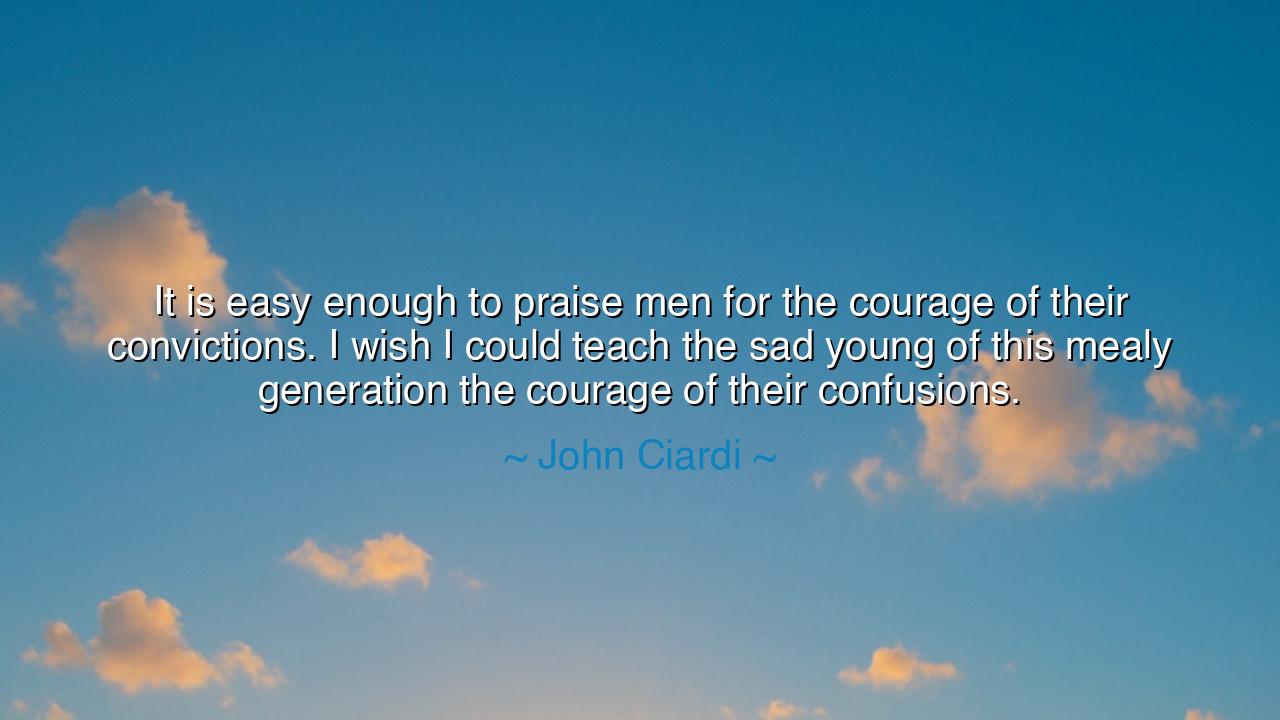
It is easy enough to praise men for the courage of their
It is easy enough to praise men for the courage of their convictions. I wish I could teach the sad young of this mealy generation the courage of their confusions.






There are words that strike the human spirit like a quiet thunder—subtle in sound, yet vast in meaning. Such are the words of John Ciardi, poet, teacher, and philosopher, who wrote: “It is easy enough to praise men for the courage of their convictions. I wish I could teach the sad young of this mealy generation the courage of their confusions.” In this haunting reflection, Ciardi offers not comfort, but challenge. He speaks not to those who are certain, but to those who wander; not to those who stand firm in their beliefs, but to those who tremble in the dark fields of doubt. For he understood that while conviction may be noble, it is confusion—when faced bravely—that gives birth to wisdom.
To have the courage of one’s convictions is the virtue most loudly praised in every age. Men and women are honored for standing firm in what they believe—refusing to yield, even when the world mocks or condemns them. Such courage builds revolutions, reforms nations, and defends truth. Yet, Ciardi, in his quiet rebellion, reminds us that this is not the highest form of bravery. For conviction, though steadfast, is still a kind of certainty; and certainty, while comforting, can harden into blindness. True growth begins not when we cling to what we know, but when we dare to question it. The courage of confusion—the willingness to dwell in uncertainty, to admit ignorance, to wrestle with complexity—is rarer, and far more sacred.
Ciardi’s lament for “the sad young of this mealy generation” reveals his concern for a society that fears not evil, but ambiguity. In his time, as in ours, many sought easy answers, quick comforts, and smooth surfaces instead of deep reflection. To be “mealy,” as he calls it, is to lack strength, to fear the friction of doubt. But Ciardi understood that confusion is the crucible of the soul. When one’s ideas are shaken, when one’s heart is divided, when one walks in the fog of not-knowing—this is when growth becomes possible. For the spirit, like a sword, must be tested in fire before it can shine. To flee confusion is to flee one’s becoming.
Consider the journey of Siddhartha Gautama, who would become the Buddha. Before his enlightenment, he was not a man of calm conviction, but of tormenting confusion. He walked away from privilege and pleasure, seeking truth in austerity and meditation, only to discover that every answer led to new questions. His courage lay not in the certainty of belief, but in the persistence of inquiry. He sat beneath the Bodhi tree not because he knew, but because he was willing to wait, to face his doubts without turning away. And in that long confrontation with confusion, he found illumination. This is the kind of courage Ciardi speaks of—the bravery to live with the unanswered until the truth reveals itself.
Many in history have shared this sacred courage. The scientist Galileo, when forced to recant his belief that the Earth moved around the sun, whispered under his breath, “E pur si muove”—“And yet it moves.” He did not know if the world would one day see what he saw; he only knew that his confusion—the tension between faith and evidence—was worth bearing. The artist Van Gogh, too, painted through madness and uncertainty, never certain of his worth, never sure if his vision was brilliance or failure. Yet through the pain of not knowing, his art transcended the boundaries of his age. Such souls prove that confusion, when faced with courage, is not weakness—it is the womb of greatness.
Ciardi’s wisdom challenges us to reclaim the virtue of uncertainty in an age obsessed with instant answers. To the young—and indeed to all who would live deeply—he offers this lesson: do not be ashamed of confusion. It is not a sign of failure, but of awakening. Let your doubts sharpen you; let your questions stretch your mind until it aches with growth. For the one who questions will eventually see farther than the one who never wonders. The one who admits “I do not know” stands at the threshold of knowing, while the one who declares “I am certain” has already closed the door.
So, my children of the mind, remember this teaching: Courage is not only to stand firm—it is also to stand uncertain. Do not worship conviction as if it were god, for even gods evolve in the hearts of men. When confusion comes, as it surely will, greet it not as an enemy but as a teacher. Sit with it as Buddha sat beneath his tree. Wrestle with it as Jacob wrestled with his angel. Out of confusion comes humility; out of humility, wisdom. And when clarity at last arrives, it will be stronger for having been tested by doubt.
Thus, take heed of John Ciardi’s wisdom: to live courageously is not merely to believe—it is to question. Do not rush to certainty, for it is a shallow pool; descend instead into the deep waters of confusion, and there, amid the dark and shifting tides, you will find the pearl of understanding. For it is not the unshaken who are wise, but those who have trembled and dared to keep walking, carrying the light of courage through the storm of their own confusions.






AAdministratorAdministrator
Welcome, honored guests. Please leave a comment, we will respond soon